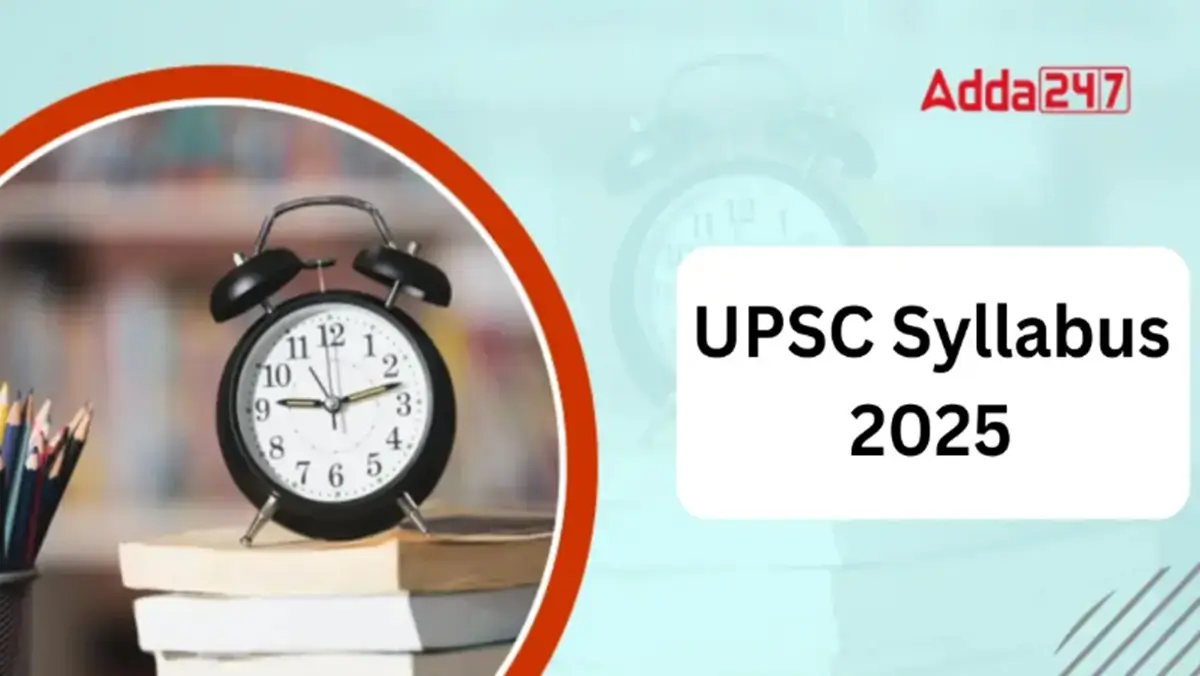Table of Contents
The Union Public Service Commission has released the official syllabus for the 2025 Civil Services Exam. If you are preparing for the exam, it is important to know the syllabus. This article covers important topics for both Prelims and Mains, including History, Polity, Geography, Economics, Current Affairs, Internal Security, Environment, Science, Technology, and more. Use this to plan your studies and prepare effectively.
UPSC Mains Exam Result 2025 – Out
UPSC Syllabus and Exam Pattern
The UPSC Civil Services Exam 2025 will be held on 25 May 2025, according to the updated UPSC Calander 2025. The exam has two stages: Prelims and Mains, followed by an interview. The Prelims include two papers: General Studies Paper-I and CSAT (which is qualifying). Candidates who pass the Prelims will move on to the Mains, a descriptive exam that affects the final merit list.
Also check the UPSC Calendar 2026
| UPSC New Syllabus Highlights | ||
| Particulars | Prelims | Mains |
| UPSC Exam Date | 25 May 2025 | 22 August 2025 |
| No. of Papers | Two | Nine |
| Types of Questions | Objective Type | Descriptive Type |
| Duration of Exam | 2 hours each | 3 hours each |
| Total Marks | 400 | 1750 |
| Medium of Exam | English & Hindi | English & Hindi (except language paper) |
| Negative Marking | ⅓rd mark | No negative marking |
| Marks Counted in Merit | No | Yes |
UPSC Exam Pattern 2025
Here is the exam pattern, including the total number of papers and the overall marks. It covers the structure and marks distribution for the exam.
| UPSC Exam Pattern 2025 | |||
| Stages | Papers | Total Papers | Marks |
| Phase 1 | UPSC Prelims | 2 Papers | 400 |
| Phase 2 | UPSC Mains | 9 Papers | 1750 |
| Phase 3 | UPSC Interview | – | 275 |
| Final Merit List is based on UPSC Mains + Interview Marks = 2025 Marks | |||
UPSC Prelims Exam Pattern 2025
| UPSC Prelims Exam Pattern 2025 | ||||
| Paper | Subjects | Marks | No. of Question | Duration |
| I | General Studies (GS) | 200 | 100 | 2 hours (9:30 AM to 11:30 AM) |
| II | CSAT | 200 | 80 | 2 hours (2:30 PM to 4:30 PM) |
| UPSC Prelims Exam details: Overview | |
| Nature of Questions |
|
| Positive Marking |
|
| Negative marking |
|
| Syllabus for General Studies 1 |
|
| Syllabus for CSAT |
|
UPSC Mains Exam Pattern 2025
Candidates who pass the UPSC Prelims exam can appear for the Mains exam. The Mains consist of two qualifying papers and seven regular papers, and the marks from these papers are used to prepare the final merit list.
| UPSC IAS Mains Exam Pattern | ||
| Qualifying Papers | ||
| Paper-A | One of the Indian Language to be selected by the candidate from the Languages included in the Eighth Schedule to the Constitution | 300 |
| Paper-B | English | 300 |
| Papers Counted for Merit | ||
| Paper-I | Essay | 250 |
| Paper-II | General Studies-I (Indian Heritage and Culture, History and Geography of the World and Society) | 250 |
| Paper-III | General Studies-II (Governance, Constitution, Polity, Social Justice and International Relations) | 250 |
| Paper-IV | Genera Studies-III (Technology, Economic Development, Bio-diversity, Environment, Security and Disaster Management) | 250 |
| Paper-V | General Studies-IV (Ethics, Integrity, and Aptitude) | 250 |
| Paper-VI | Optional Subject – Paper 1 | 250 |
| Paper-VII | Optional Subject – Paper 2 | 250 |
| Sub Total (Written Test) | 1750 | |
| Personality Test | 275 | |
| Grand Total | 2025 | |
- The Indian Language (Paper A) and English (Paper B) are qualifying papers; their marks are not considered for ranking.
- These language papers are at Matriculation or equivalent standard.
- Candidates must score at least 25% in both the Indian Language and English papers to have their Essay, General Studies, and
- Optional Subject papers considered for merit.
- Only marks from Paper I-VII will count for the final ranking.
- The Main exam papers will be of essay-type, with each paper lasting 3 hours.
- Candidates can answer all papers, except the qualifying language ones, in any language from the Eighth Schedule or in English.
- All papers (except language literature) will be available in Hindi and English.
- Blind candidates and those with locomotor disabilities or cerebral palsy will receive 20 minutes of extra time per hour for both Prelims and Mains.
UPSC Syllabus 2025 for Prelims Exam
| GS Paper 2 (CSAT) covers the following topics for UPSC Syllabus 2025 |
The UPSC Syllabus 2025 for Prelims CSAT consists of 80 questions on specific areas, with a maximum mark of 200. You have two hours to finish the questions. UPSC administers the CSAT exam in the evening.
|
UPSC Syllabus 2025 for Mains Exam
The UPSC Mains Exam consists of 4 GS + 2 optional + 1 Essay paper + 2 qualifying papers. This section goes over the UPSC syllabus for mains in great depth. It is advised that you thoroughly read this article to have a solid understanding of this section as this section will be crucial in deciding your ranking in the final merit list of the UPSC CSE 2025.
UPSC Syllabus for Mains Language Paper
The questions would follow the following general pattern in both the English Language and in Indian Language.
| Section | Topic | Description |
| English Language | Comprehension |
Understanding and interpreting given passages.
|
| Precis Writing |
Summarizing passages.
|
|
| Usage and Vocabulary |
Correct use of words and understanding their meanings.
|
|
| Short Essays |
Writing brief, coherent essays.
|
|
| Indian Languages | Comprehension |
Understanding and interpreting given passages.
|
| Precis Writing |
Summarizing passages.
|
|
| Usage and Vocabulary |
Correct use of words and understanding their meanings.
|
|
| Short Essays |
Writing brief, coherent essays.
|
|
| Translation |
Translating from English to the Indian language and vice-versa.
|
UPSC Syllabus 2025 for Essay Exam
In the exam, you will be asked to write essays on different topics, with a word limit of 1000-1250 words. It is important to stay on topic, keep your writing clear and to the point, and organize your ideas in a logical way. You will be rewarded for expressing your thoughts clearly and accurately. A helpful tip is to practice writing on philosophical topics to improve your skills.
UPSC Syllabus for GS Paper I
| Indian Heritage and Culture, History and Geography of the World and Society. |
|
UPSC Syllabus for GS Paper II
| Governance, Constitution, Polity, Social Justice and International Relations. |
|
UPSC Syllabus For GS Paper III
Technology, Economic Development, Bio diversity, Environment, Security and Disaster Management
| Topic |
Description
|
| Indian Economy |
Issues relating to planning, mobilization of resources, growth, development, and employment.
|
| Agriculture |
Major crop-cropping patterns, irrigation types and systems, storage, transport, and marketing of agricultural produce, issues, and constraints; e-technology in aid of farmers.
|
| Science and Technology |
Developments and their applications and effects in everyday life.
|
| Science & Technology |
Achievements of Indians, indigenization of technology, development of new technology, Awareness in IT, Space, Computers, robotics, Nano-technology, biotechnology, and intellectual property rights issues.
|
| Environment |
Conservation, environmental pollution and degradation, environmental impact assessment.
|
| Disaster Management | Disaster and disaster management. |
| Internal Security |
Role of external state and non-state actors in creating challenges, challenges through communication networks, role of media and social networking, basics of cyber security, money-laundering prevention.
|
UPSC Syllabus For GS Paper IV
The Ethics, Integrity, and Aptitude paper tests candidates on their honesty, moral values in public life, and ability to solve social issues and conflicts. It may include case studies to assess these qualities. The important areas covered in this paper include.
| Topic |
Description
|
| Ethics and Human Interface |
Essence, determinants, and consequences of Ethics in human actions; dimensions of ethics; ethics in private and public relationships. Human Values – lessons from the lives and teachings of great leaders, reformers, and administrators; the role of family, society, and educational institutions in inculcating values.
|
| Attitude |
Content, structure, function; its influence and relation with thought and behavior; moral and political attitudes; social influence and persuasion.
|
| Aptitude and Foundational Values for Civil Service |
Integrity, impartiality and non-partisanship, objectivity, dedication to public service, empathy, tolerance, and compassion towards the weaker sections.
|
| Emotional Intelligence |
Concepts, utilities, and application in administration and governance.
|
| Moral Thinkers and Philosophers | Contributions from India and the world. |
| Public/Civil Service Values and Ethics in Public Administration |
Status and problems; ethical concerns and dilemmas in government and private institutions; laws, rules, regulations, and conscience as sources of ethical guidance; accountability and ethical governance; strengthening of ethical and moral values in governance; ethical issues in international relations and funding; corporate governance.
|
| Probity in Governance |
Concept of public service; Philosophical basis of governance and probity; Information sharing and transparency in government, Right to Information, Codes of Ethics, Codes of Conduct, Citizen’s Charters, Work culture, Quality of service delivery, Utilization of public funds, challenges of corruption.
|
| Case Studies | Case studies on the above issues. |
UPSC Syllabus for Optional Subjects
In the UPSC Mains, there are two Optional Subject papers (Paper I and Paper II). Candidates must choose one subject from the list provided, and the chosen subject will have two papers. The following are the available Optional Subjects:
| UPSC Mains Optional Subjects List 2025 | ||||
| UPSC Agriculture Syllabus | UPSC Animal Husbandry and Veterinary Science Syllabus | UPSC Anthropology Syllabus | UPSC Botany Syllabus | UPSC Chemistry Syllabus |
| UPSC Civil Engineering Syllabus | UPSC Commerce and Accountancy Syllabus | UPSC Economics Syllabus | UPSC Electrical Engineering Syllabus | UPSC Geography Syllabus |
| Statistics | Sociology | Physics | Philosophy | Medical Science |
| Political Science and International Relations | Public Administration | Psychology | Mechanical Engineering | Mathematics |
| Zoology | Geology | History | Management | Law |
| Literature in any of the following languages | ||||
| English | Malayalam | Manipuri | Marathi | Nepali |
| Odia | Punjabi | Sanskrit | Santhali | Sindhi |
| Tamil | Telugu | Urdu | Assamese | Bengali |
| Bodo | Dogri | Gujarati | Hindi | Kannada |
| Kashmiri | Konkani | Maithili | Malayalam | – |
UPSC Interview Syllabus
The UPSC Interview is the final step in the exam process, focusing on general knowledge and world affairs. There is no specific syllabus, and it aims to assess if a candidate is fit for a civil service role. The interview is of 275 marks, while the written exams are worth 1750 marks in total.
| UPSC Syllabus for Interview | |
| Total Marks | 275 |
| Location | Union Public Service Commission Head Office, New Delhi |
| Dress Code | Formal Attire |
UPSC 2025 Syllabus PDF Download
Before the UPSC exam, candidates should download the UPSC Syllabus 2025 PDF. To succeed, candidates should first clear all the topics available in the syllabus thoroughly and focus on frequently asked questions.
How to Download UPSC CSE Syllabus PDF
- Step 1: Official UPSC Website
Go to the official website of the UPSC (https://www.upsc.gov.in/).
- Step 2: Click the Syllabus Section
On the homepage, find the Examination tab and click on it. From the drop-down menu, select Syllabus.
- Step 3: Choose the Civil Service Exam
In the Syllabus section, you will find a list of all UPSC examinations. Select the Civil Service Exam.
- Step 4: Download the Syllabus
Click on the link and the syllabus will be displayed in PDF format ready to be downloaded for your reference.
Preparation Tips to Cover the UPSC Syllabus 2025
To cover the UPSC syllabus effectively, here are some good strategies:
- Read the newspaper daily to stay updated on world affairs.
- Complete NCERTs from classes 6 to 12 for a strong base in History, Polity, Geography, and Economics.
- Solve Previous Year Papers to understand the exam pattern and question types.
- After completing the syllabus, candidates should do daily mock tests.
- Revise regularly daily, weekly, and monthly to boost your learning.



 UPPSC RO ARO Syllabus 2025, Check Prelim...
UPPSC RO ARO Syllabus 2025, Check Prelim...
 APSC Syllabus 2025, Download Prelims And...
APSC Syllabus 2025, Download Prelims And...
 Punjab PCS Syllabus 2025, New Prelims an...
Punjab PCS Syllabus 2025, New Prelims an...





